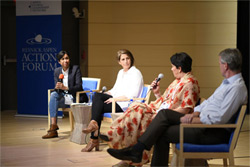Leading Toward Justice Around The Globe
On Monday, participants at the Resnick Aspen Action Forum took an in-depth look at strategies to lead toward justice and empower women and girls around the globe, beginning with a screening of “He Named Me Malala.” The film takes a look at the events leading up to the Taliban’s attack on Pakistani schoolgirl, Malala Yousafai, for speaking out on girls’ education, followed by the aftermath, including her speech to the United Nations.
Immediately after the film, a panel of Fellows from across the AGLN discussed how they use their positions to advocate for justice for women and girls across the world. Panelists included AGLN Fellows Mukti Datta, managing director of Panchachuli Women Weavers; Maria Pacheco, president and founder, Wakami; John Wood, founder, Room to Read and Heather Sonn, managing director Gamiro Investments; discuss how to empower women around the globe.
What were three main takeaways from the panelists?
Mixing business and women’s empowerment creates powerful change.
As Pacheco stated, “I am a believer in business, and a believer in women.” All three panelists have seen firsthand that when women have control over their own finances, they use those resources to improve the lives of their families and their surrounding communities.
When Pacheco was working in Guatemala, she heard constantly from women that what they really wanted was to make their own money so that they could take care of her families. Her NGO began to identify things that women could sell at the market to earn additional income. She saw what the women did with the income – and was amazed at their innovative ideas. Datta agreed, noting that when she was working with women weavers, once they made an income from their products, they began making changes for their communities – like investigating ways to use gas power rather than firewood, and getting rid of surplus cattle to make their farms more efficient.
“We had really seen what women with an opportunity to work on their dreams can do for society,” Pacheco said.
Putting women in charge of their own lives yields powerful results.
In her work in India, Datta saw herself as a catalyst rather than someone who directed operations. She gave women the opportunity to take charge of their own financial and educational decisions, and stepped back. Their confidence grew quickly, and they went from a level of basic training to a level of excellence, said Datta.
“The key to success was the fact that they themselves became their own leaders,” Datta said.
Investing in girl’s education is one of the most effective ways to enact change.
Panelist John Wood noted that for his program, Room to Read, it only costs about $300 to give a girl everything that she needs to attend school for the year. Though a small amount of money, this $300 investment has significant impacts.. For every year of schooling that a young woman receives beyond the norm, her average wages goes up by 15 to 20 percent, said Wood. And typically, panelists agreed, that money goes back to families and communities.
“It’s a theory of change: investing in women and girls’ education is the biggest no-brainer in the history of philanthropy,” Wood said.
Wood advocated for social sector and business leaders to scale up development interventions like these, noting that women’s issues cannot be pigeonholed.
“This is a human rights issue – if those of us who have resources are going to care enough to dictate what a young’s girl’s future should be … What kind of world are we going to create? Every day we lose is a day we cannot get back.”
The discussion took place at the Resnick Aspen Action Forum, which brings together leaders from across sectors to discuss global issues and develop action plans to address them. The five-day event features seminars and workshops geared toward change-agents looking to collaborate and create action pledges to implement in their respective communities.
Other Recent Posts
The final day of the 2019 Resnick Aspen Action Forum closed with a celebration of intergenerational perspectives that included presentations from young leaders and a discussion between AGLN Moderator and South African Fellow Heather Sonn and Keith Berwick, long-time friend and founding executive director of the Henry Crown Fellowship. ...
When Anousheh Ansari was seven years old, she drew a photo of a rocket flying through space and set her eyes on exploring outer space being astronaut. There was no space program in Iran at the time and the chances of Ansari becoming an astronaut were slim. “I like to prove people wrong,” said Anousheh Ansari on stage at the 2019 Resnick Aspen Action Forum. On ...
The 2019 John P. McNulty Prize laureates, five extraordinary individuals, shared their courageous and bold social impact ventures at the Resnick Aspen Action Forum on Wednesday night. McNulty Foundation President Anne Welsh McNulty, who founded the award in honor of her late husband, described the McNulty Prize as a call to action. “You have shown ...
Borders are a part of life –– whether internal, invisible, geo-political or otherwise. Borders can help and they can harm. Borders are powerful and they can also be a form of power. Understanding the borders that are around and within us can lead to greater self-awareness and open the path for making great change in the world. With inspiration from the ...
1. Draw inspiration from other participants Over 1,000 Action Pledges have been made since the inaugural Action Forum in 2013. Watch the video below on some highlighted Action Pledges. 2. Find your sweet spot The most exciting Action Pledges come from what we call your sweet spot, the intersection of your passions, talents, and your community’s ...


Leave a Comment